insist suggest 虚拟语气上课讲义
虚拟语气讲义

虚拟语气Subjunctive Mood语气是一种动词形式,用以表示说话者的意图或态度。
虚拟语气表示说话者的主观愿望、假想和建议等,所说的话有的与现在事实相反,或与过去事实相反,或与将来事实相反或与将来事实可能相反。
所以虚拟语气总是与假设条件句用在一起。
除了if条件句外,还有几种常用的条件句,短语也可表示条件。
此外,上下文也能创造虚拟的语言环境。
但有时条件从句与结果主句可能发生时间不一致,有时虚拟语气会出现倒装情况。
除了与条件句在一起使用的主句用虚拟语气外,在名词从句中也可使用虚拟语气。
条件句可分为两类,一类为真实条件句,一类为非真实条件句。
非真实条件句表示的是假设或实际可能性不大的情况,故采用虚拟语气。
If he doesn’t hurry up, he will miss the bus. If he is free, he will ask me to tell stories.If I were you, I would go at once. If there were no air, people would die.①表示与现在事实相反的情况:If I were you, I would take an umbrella.If I knew his telephone number, I would tell you.If I could type, I might save lot of timeIf it were not for their loan, our life would be very difficult.If it were not for your timely help, we would be in serious trouble.②表示与过去事实相反的情况:If I had got there earlier, I would have met her.If he had taken my advice, he would not have made such a mistake.If the problem had been solved in time, we might have completed the project last month.If we had found him earlier, we might have saved him.If I had tried my best, I could have earned much more money.If he had apologized, you should have done so too.If it had not been for her good care, I might not have got well so soon.③表示对将来情况的主观推测或可能违背将来事实的假设:这种情况下一般指的是将来情况下不大可能发生的情况,或者虽有可能发生,但说话人主观上不希望它发生。
insist suggest 虚拟语气
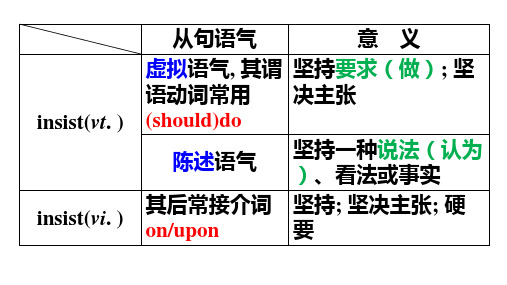
insist(vt. )
insist(vi. )
从句语气 意 义 虚拟语气, 其谓 坚持要求(做); 坚 决主张 语动词常用 (should)do 坚持一种说法(认为 陈述语气 )、看法或事实 其后常接介词 坚持; 坚决主张; 硬 on/upon 要
1. He insisted on paying for the meal.
2. Mother insisted on our washing the clothes by ourselves. =Mother insisted that we should wash the clothes by ourselves.
3. Our parents always insisted that they were right when we have different ideas.
insist on sth insist on doing.... insist on sb's doing......
we insist on a program environment that reinforces our corporate messages. since they insist on going, we will simply push the boat with the current and let them go with us. I must insist on your giving me a straightforward answer.
suggest在接宾语从句时的两种情况: 从句语气 意 虚拟语气, 其谓 建议 语动词常用 suggest(vt. ) (should)do 陈述语气 义
Байду номын сангаас
中考英语易混词语suggest和insist用法讲解

中考英语易混词语suggest和insist用法讲解中考英语易混词语suggest和insist用法讲解suggest和insistA. suggest, suggestion做建议解,insist, insistence做坚决主张、坚决要求解时,that引起的宾语从句、主语从句和同位词从句的`谓语动词皆用虚拟语气,即:谓语动词用should+动词原形,should 也可以省略。
如:(1)The manager suggested that we (should) make an immediate decision.=The manager suggested our (us) making an immediate decision.=The managers suggestion is that we (should) make an immediate decision. = That we (should) make an immediate decision is the managers suggestion. =That we (should) make an immediate decision is suggested by the manager.经理建议我们马上做出决定。
(2)The doctor insisted that he (should) stay in bed for another five days.=The doctor insisted on his staying in bed for five more days.= The doctors insistence is that he (should) stay in bed for five more days.=That he (should) stay in bed for another five days is the doctors insistence.= That he (should) stay in bed for five more days is insisted by the doctor .大夫坚决主张他在床上再待5天。
Insist和suggest类虚拟语气用法
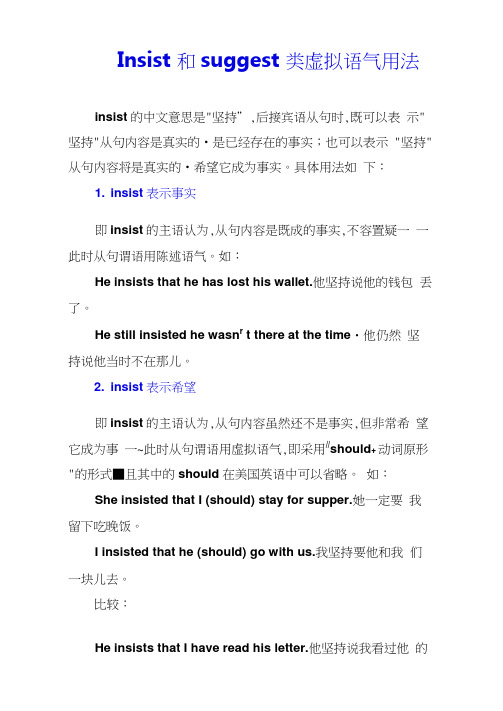
Insist和suggest类虚拟语气用法insist的中文意思是"坚持”,后接宾语从句时,既可以表示"坚持"从句内容是真实的•是已经存在的事实;也可以表示 "坚持"从句内容将是真实的•希望它成为事实。
具体用法如下:1. insist表示事实即insist的主语认为,从句内容是既成的事实,不容置疑一一此时从句谓语用陈述语气。
如:He insists that he has lost his wallet.他坚持说他的钱包丢了。
He still insisted he wasn r t there at the time・他仍然坚持说他当时不在那儿。
2. insist表示希望即insist的主语认为,从句内容虽然还不是事实,但非常希望它成为事一~此时从句谓语用虚拟语气,即采用//should+ 动词原形"的形式■且其中的should在美国英语中可以省略。
如:She insisted that I (should) stay for supper.她一定要我留下吃晚饭。
I insisted that he (should) go with us.我坚持要他和我们一块儿去。
比较:He insists that I have read his letter.他坚持说我看过他的信。
He insists that I should read his letter.他坚持要我看他的信。
第一句用的是陈述语气•说明主句主语he认为从句内容"我看过他的信"是已经发生的事实;第二句用的是虚拟语气,说明主句主语he认为从句内容"我看他的信”还不是事实•但他希望这能成为事实。
请注意体会下面一个例子,也是一样的情形:He insisted that he was not ill, but the doctor insiste d that he should take the medicine.他坚持说他没有病,但医生却坚持要他服药。
助力专升本虚拟语气讲义(下)
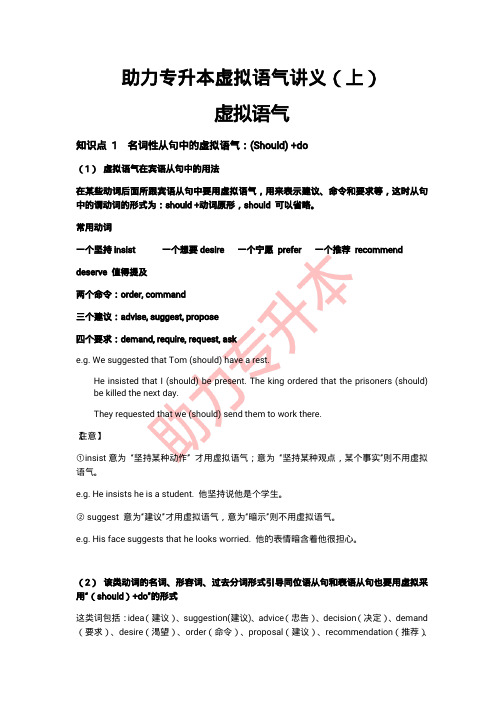
助力专升本虚拟语气讲义(上)虚拟语气知识点1名词性从句中的虚拟语气:(S h o u l d)+d o(1)虚拟语气在宾语从句中的用法在某些动词后面所跟宾语从句中要用虚拟语气,用来表示建议、命令和要求等,这时从句中的谓动词的形式为:s h o u l d+动词原形,s h o u l d可以省略。
常用动词一个坚持i n s i s t一个想要d e s i r e一个宁愿p r e f e r一个推荐r e c o mme n dd e s e r v e值得提及两个命令:o r d e r,c o mma n d三个建议:a d v i s e,s u g g e s t,p r o p o s e四个要求:d e ma n d,r e q u i r e,r e q u e s t,a s ke.g.We s u g g e s t e d t h a t T o m(s h o u l d)h a v e a r e s t.H e i n s i s t e dt h a t I(s h o u l d)b e p r e s e n t.T h e k i n go r d e r e dt h a t t h e p r i s o n e r s(s h o u l d)b e k i l l e d t h e n e x t d a y.T h e y r e q u e s t e d t h a t w e(s h o u l d)s e n d t h e m t o w o r k t h e r e.【注意】①i n s i s t意为“坚持某种动作”才用虚拟语气;意为“坚持某种观点,某个事实”则不用虚拟语气。
e.g.H e i n s i s t s h e i s a s t u d e n t.他坚持说他是个学生。
②s u g g e s t意为“建议”才用虚拟语气,意为“暗示”则不用虚拟语气。
高中虚拟语气讲解课件(公开课)
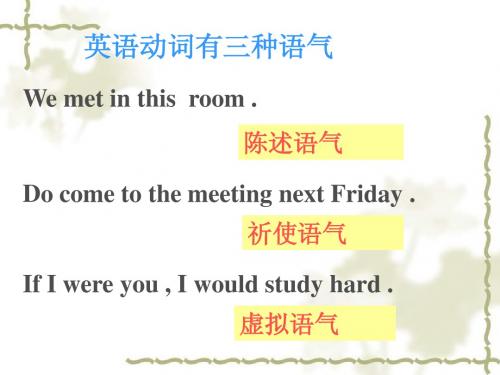
would be ____________ (be) a college student now.
倒装的If虚拟句
省略 if 的条件从句 ( were had should)
1.If I were to meet him tomorrow, I should ask him about it.
Were I to meet him tomorrow,… 2.If he should fail in the experiment this time, he would try again. Should he fail in the experiment…
otherwise / or
副词 / 连词 but
1. Without sunlight , or water or air , there ___ B no life on the earth . A will have B would be C can be D must be 2 But for the snow , we ___ B earlier . A will arrive B would have arrived C arrive D arrived
2.Had they known what was coming next , they _____ second thoughts. D A. may have B. could have
C. must have had D. might have had
含蓄虚拟条件
with 介词 without but for 要不是因为
C. is
D. had been
3. She cried so sadly as if her heart D ________ . A. breaks B. broken
Insist和suggest类虚拟语气用法

Insist和suggest类虚拟语气用法insist的中文意思是“坚持”,后接宾语从句时,既可以表示“坚持”从句内容是真实的,是已经存在的事实;也可以表示“坚持”从句内容将是真实的,希望它成为事实。
具体用法如下:1. insist表示事实即insist的主语认为,从句内容是既成的事实,不容置疑——此时从句谓语用陈述语气。
如:He insists that he has lost his wallet. 他坚持说他的钱包丢了。
He still insisted he wasn’t there at the time. 他仍然坚持说他当时不在那儿。
2. insist表示希望即insist的主语认为,从句内容虽然还不是事实,但非常希望它成为事实——此时从句谓语用虚拟语气,即采用“should+动词原形”的形式,且其中的should在美国英语中可以省略。
如:She insisted that I (should) stay for supper. 她一定要我留下吃晚饭。
I insisted that he (should) go with us. 我坚持要他和我们一块儿去。
比较:He insists that I have read his letter. 他坚持说我看过他的信。
He insists that I should read his letter. 他坚持要我看他的信。
第一句用的是陈述语气,说明主句主语he认为从句内容“我看过他的信”是已经发生的事实;第二句用的是虚拟语气,说明主句主语he认为从句内容“我看他的信”还不是事实,但他希望这能成为事实。
请注意体会下面一个例子,也是一样的情形:He insisted that he was not ill, but the doctor insiste d that he should take the medicine. 他坚持说他没有病,但医生却坚持要他服药。
2025届高考英语语法复习虚拟语气知识讲解讲义
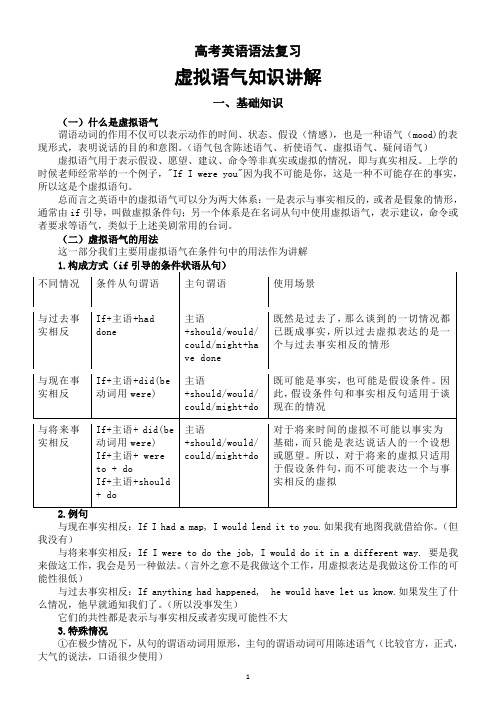
高考英语语法复习虚拟语气知识讲解一、基础知识(一)什么是虚拟语气谓语动词的作用不仅可以表示动作的时间、状态、假设(情感),也是一种语气(mood)的表现形式,表明说话的目的和意图。
(语气包含陈述语气、祈使语气、虚拟语气、疑问语气)虚拟语气用于表示假设、愿望、建议、命令等非真实或虚拟的情况,即与真实相反。
上学的时候老师经常举的一个例子,"If I were you"因为我不可能是你,这是一种不可能存在的事实,所以这是个虚拟语句。
总而言之英语中的虚拟语气可以分为两大体系:一是表示与事实相反的,或者是假象的情形,通常由if引导,叫做虚拟条件句;另一个体系是在名词从句中使用虚拟语气,表示建议,命令或者要求等语气,类似于上述美剧常用的台词。
(二)虚拟语气的用法这一部分我们主要用虚拟语气在条件句中的用法作为讲解不同情况条件从句谓语主句谓语使用场景与过去事实相反If+主语+haddone主语+should/would/could/might+have done既然是过去了,那么谈到的一切情况都已既成事实,所以过去虚拟表达的是一个与过去事实相反的情形与现在事实相反If+主语+did(be动词用were)主语+should/would/could/might+do既可能是事实,也可能是假设条件。
因此,假设条件句和事实相反句适用于谈现在的情况与将来事实相反If+主语+ did(be动词用were)If+主语+ wereto + doIf+主语+should+ do主语+should/would/could/might+do对于将来时间的虚拟不可能以事实为基础,而只能是表达说话人的一个设想或愿望。
所以,对于将来的虚拟只适用于假设条件句,而不可能表达一个与事实相反的虚拟与现在事实相反:If I had a map, I would lend it to you.如果我有地图我就借给你。
(但我没有)与将来事实相反:If I were to do the job, I would do it in a different way. 要是我来做这工作,我会是另一种做法。
虚拟语气知识点讲解和写作运用讲义-高三英语写作专项
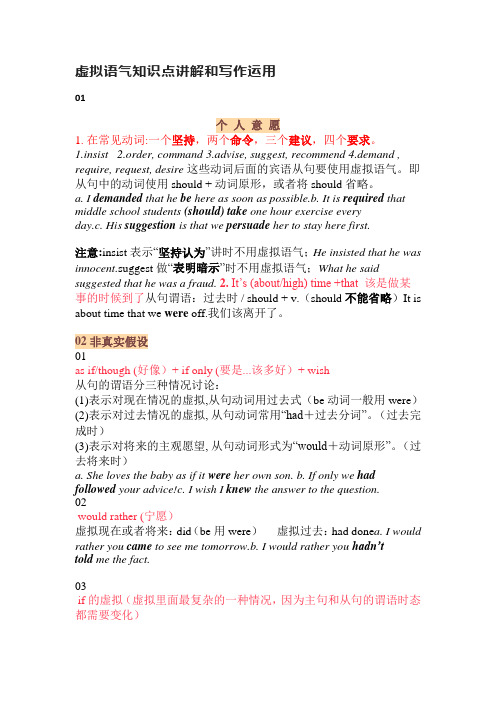
虚拟语气知识点讲解和写作运用01个人意愿1. 在常见动词:一个坚持,两个命令,三个建议,四个要求。
1.insist2.order, command3.advise, suggest, recommend4.demand , require, request, desire这些动词后面的宾语从句要使用虚拟语气。
即从句中的动词使用should + 动词原形,或者将should省略。
a. I demanded that he be here as soon as possible.b. It is required that middle school students (should) take one hour exercise everyday.c. His suggestion is that we persuade her to stay here first.注意:insist 表示“坚持认为”讲时不用虚拟语气; He insisted that he was innocent.suggest 做“表明暗示”时不用虚拟语气;What he said suggested that he was a fraud.2. It’s (about/high) time +that该是做某事的时候到了从句谓语:过去时 / should + v.(should 不能省略)It is about time that we were off.我们该离开了。
02 非真实假设01as if/though (好像)+ if only (要是...该多好)+ wish从句的谓语分三种情况讨论:(1)表示对现在情况的虚拟,从句动词用过去式(be动词一般用were)(2)表示对过去情况的虚拟, 从句动词常用“had+过去分词”。
(过去完成时)(3)表示对将来的主观愿望, 从句动词形式为“would+动词原形”。
(过去将来时)a. She loves the baby as if it were her own son.b. If only we had followed your advice!c. I wish I knew the answer to the question.02would rather (宁愿)虚拟现在或者将来:did(be 用were)虚拟过去:had done a. I would rather you came to see me tomorrow.b. I would rather you hadn’ttold me the fact.03if的虚拟(虚拟里面最复杂的一种情况,因为主句和从句的谓语时态都需要变化)条件从句从句的谓语形式主句的谓语形式现在过去时(were)would/could/should/might +V.(原)would/could/should/might +have + p.p.过去过去完成时haddonewould/could/should/might +V.(原)未来 1.过去时2.should+v.3.were to dolistened to the teacher carefully, I would have passed the exam.c. Ifwe had another 7-day holiday, all of us would be much happier.2)混合条件句主句与从句的动作发生在不同的时间,这时主、从句谓语动词的虚拟语气形式因时间不同而不同,这叫做混合条件句。
2023届高考英语虚拟语气的用法归纳讲义

虚拟语气如何用(1)对现在状况的虚拟对现在状况的虚拟,条件句中谓语动词用一般过去时,主句用“would/should/might/could+动词原形”。
(2)对过去状况的虚拟对过去状况的虚拟,条件句中谓语动词用过去完成时,主句用“would/should/might/could+have+过去分词”。
(3)对将来状况的虚拟对将来状况的虚拟,条件句中谓语动词可用should do, were to do或动词的过去式三种形式表示,但意义略有不同。
should表示的可能性比较大,动词过去式的可能性次之,were to do的可能性比较小。
主句谓语动词用“would/should/might/could+动词原形”。
(4)错综时间条件句有时条件从句谓语动词表示的动作和主句谓语表示的动作发生的时间不一致,这类句子称为错综时间条件句。
此时主从句动词的形式应通过各自所表示的时间开展调整。
If you had taken my advice then, you wouldn't be in trouble now.假如当时听我劝,你现在就不会有麻烦了。
(if条件句是对过去的虚拟,故用过去完成时,而主句是对现在的虚拟,故用“would+动词原形”形式。
)(5)表示“建议、命令、要求、坚决做”等动词后的宾语从句常用“(should+)动词原形(6)wish后的宾语从句wish后的宾语从句用一般过去时表示现在的状况,用过去完成时表示过去的状况,用would/could do表示将来的状况。
(7)would rather 后的宾语从句would rather后的从句常用一般过去时形式,表示现在或将来的状况;用过去完成时,表示过去的状况(8)It is/was important (necessary, appropriate, proper, right, essential, vital, etc.) that英语虚拟语气有什么用法一.定义: 动词虚拟语气表示说话人的愿望, 假设, 猜测, 建议, 请求, 意图, 设想等未能或不可能成为事实的状况, 或者在说话人看来实现可能性很小的状况, 而不表示客观存在的现实二.虚拟语气的表现形式: 根据句中谓语动词的特殊形式来表现. 这些特殊形式与谓语动词的某些时态相同, 但它们只表示语气, 而不表示时态, 但含有一定的时间定义虚拟语气的用法一.虚拟语气在简单句中的用法: 谓语动词用原形或may +动词原形1.表示祝愿a. Long live our country.b. May you succeed.c. May you be happy all your life.2.表示命令a. Everybody leave the room.二.虚拟语气在非真实条件句中的用法: (使用虚拟语气的含条件句的复合句称为真实条件句)1.表示与现在事实相反的状况时, if从句的谓语用动词的过去式(be动词的过去式多用were, 而不用was), 主句的谓语用should / would / could / might +动词原形(should多用于第一人称, would多用于二三人称, could / might可用于全部人称)a. If I had more time, I should study computer better.b. If he were not so busy, she would attend the meeting this afternoon.c. If they didn’t take exercises every day, they wouldn’t be so healthy.d. If you went to bed earlier, you would not be so sleepy in the morning.e. If she invited me, I should go to the party.2.表示与过去事实相反的状况时, if从句的谓语用had done形式, 主句的谓语用should / would / could / might + have done的形式a. If she had invited me yesterday, I should have gone to the party.b. I would have checked my paper again if I had had more time at yesterday’s exam.c. If you had taken the teacher’s advice, you would not have failed in the exam.3.表示与将来事实相反的状况时, if从句的谓语形式是: ①.完全动词过去式(be的过去式通常用were); ②.should +动词原形; ③.were to do. 其中②, ③种状况都含有出乎意料之外之意; 主句的谓语的形式是: should / would / could / might +动词原形a. If she should invite me tomorrow, I should go to the party.b. If it rained / should rain / were to rain tomorrow, our picnic would be put off.c. If I saw him tomorrow, I would pass your note to him.d. I might come back if I were to miss the train.三.虚拟语气在非真实条件句中用法的几个变体:1.条件从句省略if: 在书面语中, 假如条件从句中的谓语中有were, had, should等词, 可将if省略, 而把were, had, should放到句首a. Were I you (=If I were you ), I would get up early very early.b. Had you arrived (=If you had arrived ) at the station ten minutes earlier yesterday, you could have caught the train.2.省略条件从句或主句, 省略部分的含义仍有所体现. 省略主句时, 表示己不能实现的愿望a. You could have done it yourself (if you had wanted to).b. I wouldn’t smoke (if I were you).c. If my old friends were with me! (要是老朋友和我在一起该多好啊)d. If you could have seen the wonderful film!3.主从句时间不一致时, 主从句谓语动词的形式取决于要表示的详细时间a. You would speak English well if you had practised speaking it every day.b. If she hadn’t trained so hard, she wouldn’t be able to run so fast.4.假设的条件不以条件从句, 而以别的方式如介词短语、从句等表达出来, 这种句子称为含蓄条件句a. What would you do with a million dollars?b. Without music, the world would be a dull place.c. We could have done better with more money.d. He would have given you more help, but he has been so busy.四.虚拟语气在as if / though从句中的用法:1.表示与现在事实相反或对相在状况有所怀疑, as if / though从句谓语用过去式a. He speaks English so well as if she had studied English in England.b. She looked as if she were ill.2.表示与过去事实相反的状况, as if / though从句谓语用过去完成式a. The machines operated as if it had been repaired.五.虚拟语气在含even if / though从句的复合句中的用法:在此类复合句中, 若表示与事实相反, 可用虚拟语气形式. 主从句的谓语动词形式与非真实条件句相同a. Even if I were rich, I would work.六.虚拟语气在主语从句中的用法:假如表示说话人的看法, 想法或意见, 在句型It is / was + adj. + that从句中, 主语从句中可用虚拟语气. 主语从句中谓语动词用should do表示现在或将来状况, 用should have done表示过去状况a. It is necessary that you should clean the lab before you left.b. It is important that you should take the doctor’s advice.c. It was very strange that he should have left without say goodbye.七.虚拟语气在宾语从句中的用法:1.在wish的宾语从句中, 通常表示不可能实现或没有实现的愿望, 常用虚拟语气①.wish的宾语从句用过去式, 表示现在或将来没有实现或不可能实现的愿望a. I wish I knew the result of the match now.b. I wish it were spring here all the year round.c. I wish I could help you.d. I wish I were young.②.wish的宾语从句用过去完成式, 表示过去没有实现或不可能实现的愿望a. We wish we had got the film tickets last night.b. I wish you I had met him yesterday.③.wish的宾语从句若用would, 则一般表示请求, 对现状不满或期待未来有所改变a. I wish the prices would come down.b. I wish you would help me.c. I wish he would be more careful.d. We wish you would spend the holiday with us.2.在动词suggest (建议), advise (建议), demand (要求), require (要求), order (命令), insist (坚持)后的宾语从句中, 谓语动词常用( should )+动词原形的虚拟语气形式a. I suggested that we should go there at once.b. I demand that he should answer me at once.c. The doctor insisted that the patient should stay in bed for two weeks.d. The officer ordered that the soldiers should stop playing.与名词suggestion建议/ advice 建议/ demand要求/ request要求/ order 命令有关的从句(包括同位语从句和表语从句等)中的谓语也用( should ) +动词原形a. The black people made a strong demand that the government ( should ) take steps to change the unfair situation.b. Their demand is that the government should take steps to change the unfair situation.c. I was Bill’s suggestion that everybody should have a map.d. His suggestion was that everybody should have a map.八.虚拟语气用在句型: It is time that(该做某事了)中: that从句中的谓语动词用过去式a. It is time we got up.九.虚拟语气用在if only引导的感叹句中: 表示但愿, 要是就好了, 其中谓语形式与wish的宾语从句相同a. If only he didn’t drive so fast! ( =I wish he didn’t drive so fast.)b. If only he had taken the doctor’s advice. ( =I wish he had taken the doctor’s advice.)c. If only the rain would stop! ( =I wish the rain would stop.)十.虚拟语气用在would rather / prefer后的that从句中: 表示现在或将来状况谓语动词用过去时形式, 表示过去状况动词用过去完成时形式a. I would rather he came next Saturday.b. I would prefer you had seen the film yesterday.c. I would rather that he painted the house blue。
虚拟语气讲解

虚拟语气一.虚拟语气在名词性从句中的用法1.虚拟语气在宾语从句中的使用(1)在表示建议、命令、要求等动词advise, suggest, urge, recommend, ask, request, require, demand, insist, propose, order, command, desire等词后面的宾语从句中用虚拟语气,谓语部分用“should+动词原形”should可以省略。
I suggest that we (should) hold a meeting tonight.The workers in the factory demanded that their pay (should0 be raised by 20 percent.They insisted that the boy (should) go with them.注意:当suggest意义为“建议”时用虚拟语气;意义为“暗示,表明”时用陈述语气。
当insist意义为“坚持要求”时用虚拟语气;意义为“坚持说”时用陈述语气。
The smile on his face suggested that he was satisfied with our work.He insisted that he was a party member and that he (should) go to the accident scene.(2)动词wish后的宾语从句中使用虚拟语气,谓语部分用“动词过去式(与现在事实相反)”“动词过去完成式(与过去事实相反)”和“could/would/might+动词原形(与将来事实相反)”I wish I knew the answer.I wish I had solved the problem.I wish I could travel on the moon.How I wish I would see my grandparents again!(3)在动词would rather后的宾语从句中的虚拟语气,谓语部分用“动词过去式(与现在事实相反)”,“动词过去完成式(与过去事实相反)”I would rather that you weren’t here.I would rather that he had done something differently.2.在主语从句,表语从句,同位语从句中的虚拟语气(1)在“It is important/ necessary/ possible/ probable/ funny/ strange/ natural/ normal/ usual/ pitiful/ advisible/ desirable/ a pity/ no wonder/ …that…”句型中,that引导的主语从句中用虚拟语气,谓语部分用“should+动词原形”should可以省略It is necessary that a doctor (should) be sent for at once.It is strange that you (should) come today.It is unnatural that a little child (should) be so tired.(2)与动词advise, suggest, urge, recommend, ask, request, require, demand, desire, insist, propose, order, command;desire等有关的名词性从句或与这些动词派生的名词advice, suggestion, recommendation, request, requirement, demand, desire, insistence(要求;坚持);, proposal,order等有关的名词性从句中用虚拟语气,谓语部分用“should+动词原形”should 可以省略。
insist suggest 虚拟语气上课讲义
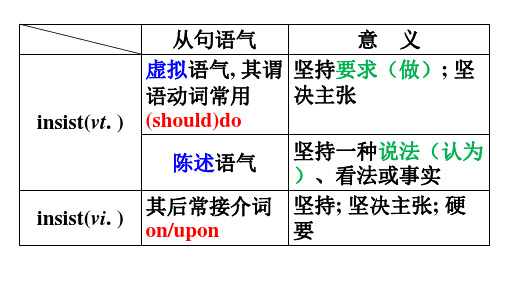
insist on sth insist on doing.... insist on sb's doing......
we insist on a program environment that reinforces our corporate messages. since they insist on going, we will simply push the boat with the current and let them go with us. I must insist on your giving me a straightforward answer.
insist(vt. ) insist(vi. )
从句语气
意义
虚拟语气, 其谓 坚持要求(做); 坚 语动词常用 决主张
(should)do
陈述语气
坚持一种说法(认为 )、看法或事实
其后常接介词 坚持; 坚决主张; 硬
on/upon
要
1. He insisted on paying for the meal.
2. Mother insisted on our washing the clothes by ourselves.
=Mother insisted that we should wash the clothes by ourselves.
3. Our parents always insisted that they were right when we have gest在接宾语从句时的两种情况:
从句语气
意义
虚拟语气, 其谓 语动词常用 建议
suggest(vt. ) (should)do
- 1、下载文档前请自行甄别文档内容的完整性,平台不提供额外的编辑、内容补充、找答案等附加服务。
- 2、"仅部分预览"的文档,不可在线预览部分如存在完整性等问题,可反馈申请退款(可完整预览的文档不适用该条件!)。
- 3、如文档侵犯您的权益,请联系客服反馈,我们会尽快为您处理(人工客服工作时间:9:00-18:30)。
insist on sth insist on doing.... insist on sb's doing......
we insist on a program environment that reinforces our corporate messages. since they insist on going, we will simply push the boat with the current and let them go with us. I must insist on your giving me a straightforward answer.
insist(vt. ) insist(vi. )
从句语气
意义
虚拟语气, 其谓 坚持要求(做); 坚 语动词常用 决主张
(should)do
陈述语气
坚持一种说法(认为 )、看法或事实
其后常接介词 坚持; 坚决主张; 硬
on/upon
要
1. He insisted on paying for the meal.
suggest在接宾语从句时的两种情况:
从句语气
意义
虚拟语气, 其谓 语动词常用 建议
suggest(vt. ) (should)do
陈述语气 暗示,表明
*He suggested that we should leave at once. *His pale face suggested that he was weak.
2. Mother insisted on our washing the clothes by ourselves.
=Mother insisted that we should wash ents always insisted that they were right when we have different ideas.
